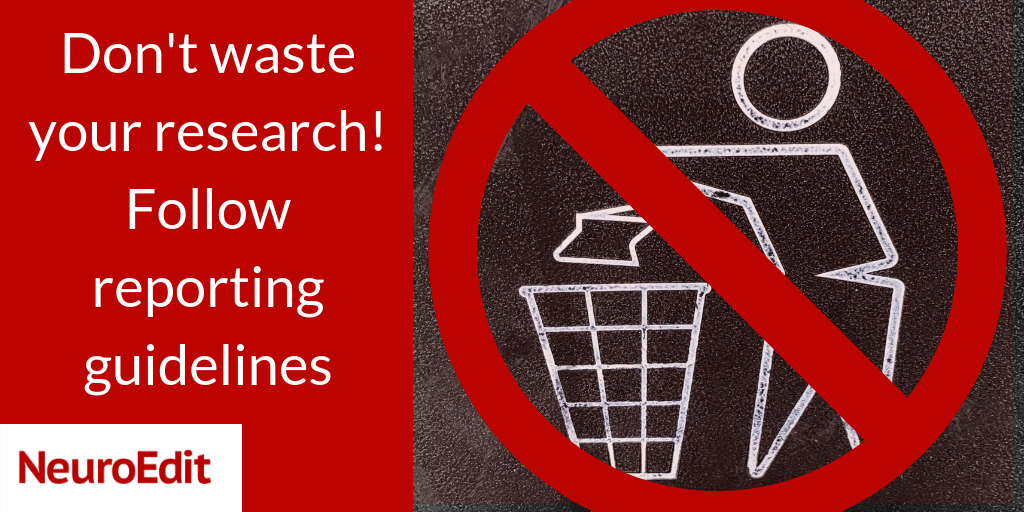|
A shocking amount of health research is thrown away. Are you sitting down? It’s estimated that 85% of all health research is avoidably wasted. This happens because:
But how do you know what to report? Thankfully, there is plenty of help out there. Guidelines have been developed and published specifically to help authors remember all the essential points that should be included when writing about a study. There are more than 400 of them (all named with catchy acronyms) covering every kind of study. Major ones include CONSORT for randomised clinical trials, STROBE for observational studies, PRISMA for systematic reviews, and ARRIVE for animal studies. For example, if you're reporting on a clinical trial, the CONSORT guidelines will help ensure you include the following in your report (among many other points):
Is it compulsory to follow these guidelines? Some journals do require submitted manuscripts to follow reporting guidelines, but many more just recommend doing so. So for most journals, no, following these guidelines is not compulsory. However, in my strong opinion, it seems senseless to ignore them, especially given the shocking statistic on waste, which is largely a result of authors not following such guidelines. Reporting your study completely - by following the appropriate guideline and including all the information listed in the checklist for that guideline - will benefit you, your colleagues, and the field as a whole. In addition, it will avoid wasting the valuable resources used in your study - whether this means the money you spent on reagents and equipment, animals that were sacrificed in the pursuit of scientific advancement, or human volunteers who gave their time and exposed themselves to the risks of research. All the guidelines named above - and hundreds more - are listed in a searchable database from the Equator Network, which also has a flow chart and tools to help you choose the most appropriate guideline for your study. Next, find out how you can write in a way that helps boost citations once you've published! And if you missed it, catch up on the previous post in this series, where I explain how writing well can help you improve the peer review process. At NeuroEdit, we help researchers publish faster and more effectively. We work with native and non-native English speakers at all stages of their career. If you're writing a paper and all the information we've listed above sounds too time-consuming or too difficult to implement, we can help. Not only can we ensure your manuscript follows the right guideline for your study, but we will also eliminate linguistic errors, make your writing engaging, showcase your figures professionally (including CONSORT flowcharts), and more - usually within a week, and often for around the price of an antibody! Contact us to see how we can help you improve your manuscript.
0 Comments
Your comment will be posted after it is approved.
Leave a Reply. |
We've helped researchers publish in:
/
- 1
- 2
- 3
- 4
- 5
PNAS, NeuroImage, Journal of Neuroscience, Scientific Reports, Neurobiology of Aging, Frontiers in Molecular Neuroscience, Journal of Psychiatric Research, Journal of Physiology, Frontiers in Cellular Neuroscience, Journal of Alzheimer's Disease, Journal of Neurochemistry, American Journal of Physiology: Cell Physiology, Behavioural Brain Research, Frontiers in Neurology, and more...
/
- 1
- 2
- 3
- 4
- 5
/
- 1
- 2
- 3
- 4
- 5
PLoS One, Brain Research, Psychiatry Research, Brain Research Bulletin, European Journal of Pharmacology, Psychological Research, International Journal of Developmental Neuroscience, Metabolic Brain Disease, Journal of Cardiovascular Pharmacology, Journal of Molecular Neuroscience, Cell and Molecular Neurobiology, Journal of the Neurological Sciences, Neuroscience Letters, and more...
/
- 1
- 2
- 3
- 4
- 5
- 0
- 1
Leave the manuscript with us. Your research needs you.
© 2011–2024 NeuroEdit Ltd.
NeuroEdit Ltd is a company registered in England and Wales, number 10232582.
Registered office address: Dale House 64 Fink Hill, Horsforth, Leeds, England, LS18 4DH.
Privacy policy
NeuroEdit Ltd is a company registered in England and Wales, number 10232582.
Registered office address: Dale House 64 Fink Hill, Horsforth, Leeds, England, LS18 4DH.
Privacy policy


 RSS Feed
RSS Feed
